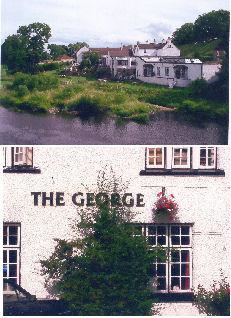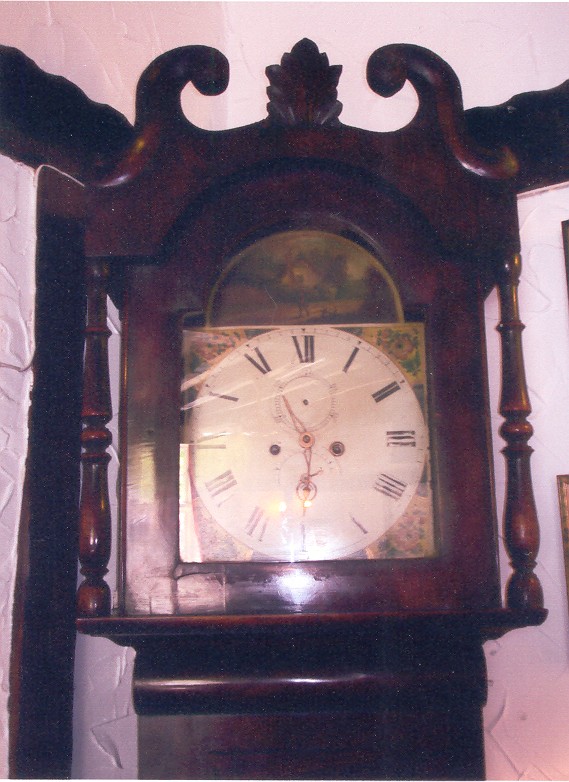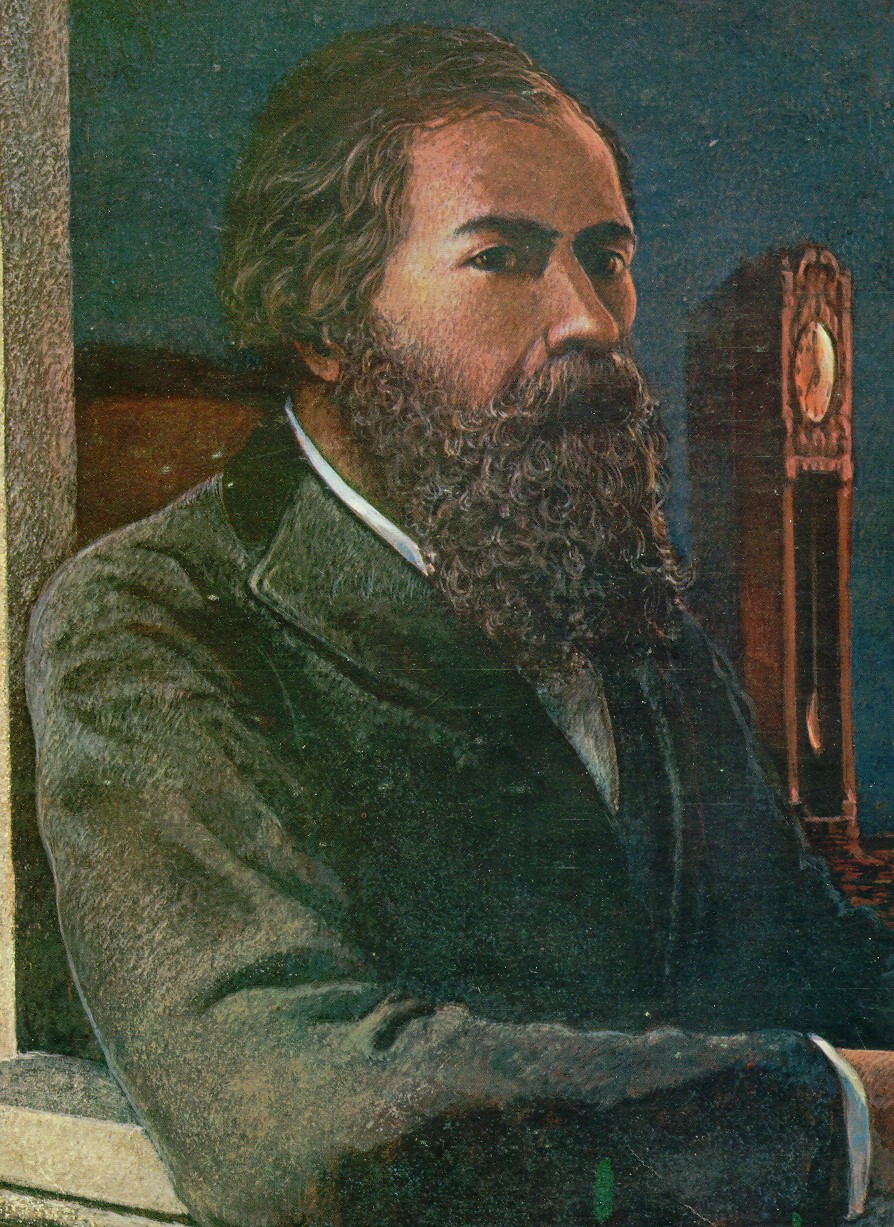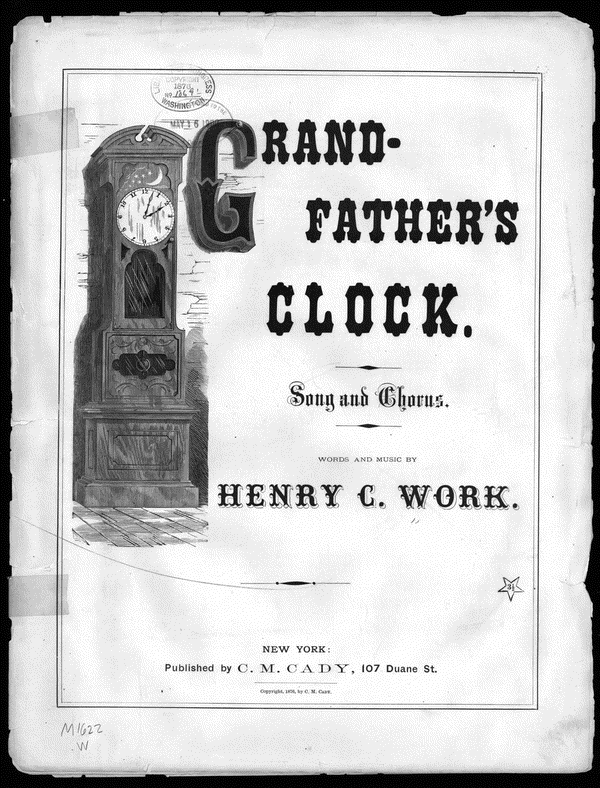How an Old Floor Clock Became a Grandfather
[Published in The Pride of Olney, official newsletter of the Lions Club of Olney, Maryland,
Volume XXX, No. 76, October 2005]
By Henry Zecher
 Everybody has heard the song or read the poem. The story is wonderfully told
in lyrics that are perfect as well as poignant, and most assume it to be
nothing more than a lovely song, except for one thing ~ the clock this song
memorialized is real, and the story it tells is true. Pretty much!
Everybody has heard the song or read the poem. The story is wonderfully told
in lyrics that are perfect as well as poignant, and most assume it to be
nothing more than a lovely song, except for one thing ~ the clock this song
memorialized is real, and the story it tells is true. Pretty much!It began at the George Hotel, a lone haven of hospitality by the Dere Street, an old Roman road at Piercebridge, near Darlington, on the Durham side of the River Tees, in North Yorkshire, England. This charming 16th century riverside Coaching Inn, sitting at the gateway to the beautiful Yorkshire Dales, was a rest stop for weary travelers, and has been in business longer than North America has.
Among the famous and infamous who have visited the George Hotel were Queen Victoria’s Prince Consort, Prince Albert, and the infamous highwayman, Dick Turpin. Along with the 35 bedrooms (all ensuite, and many with four-poster beds), the George boasts an award-winning chef and a beautiful riverside restaurant to enjoy his fare. The hotel displays many ancient Roman artefacts brought up from the river. Some of the furniture and outside signage were hand-carved by the legendary Robert Mousey Thompson (1876-1955), also known as "the Mouseman" because of the trademark he created: a small mouse carved on almost every piece of furniture that he or his fellow craftsmen ever made.

The hotel was managed about 150 years ago by two bachelor brothers named Jenkins, and in a sun-lit corner of the reception area stood a longcase clock, or floor clock, as they were called back then. Today, on its time-worn face, the name of the clock maker ~ Thompson, of Darlington ~ is discernible. James Thompson of High Row died in 1825, to be followed by his son Samuel, which makes this clock perhaps two centuries old. Thompson was well-known throughout the region for the quality of his watches and clocks, so it would have been from him that the proprietor of the George Hotel purchased the floor-standing clock shown at right. It was, among other things, a mark of distinction.
Since the discovery of pendulums and invention of pendulum clocks, floor clocks ~ 6- to 7˝-foot tall pendulum clocks enclosed in a wooden case and standing on the floor ~ had become quite popular; but they were not known for their accuracy. A decent floor clock might lose from mere minutes to half an hour each day. Thus, the most unusual characteristic about the floor clock in the George Hotel was that it kept very good time, and everyone in town remarked upon it...that is, until one of the Jenkins brothers died, and suddenly the old clock began running slow.
At first it lost a few minutes, then up to 15 minutes per day, but after several clocksmiths gave up trying to repair it, it was losing more than an hour a day. The clock’s problem became as much a topic of conversation as its precision had once been. Then, when the surviving Jenkins brother died at the age of 90, and although it had been fully wound, the old clock stopped ~ at precisely 11:05, according to the stories, although it now rests at 11:30 ~ and never ran again.
The new manager of the hotel tried to have it repaired, but to no avail. So, he left it standing in a sunlit corner of the lobby – dusted and polished, but silent, its hands resting in the position they assumed the moment the last brother died. Besides, it made for a great story, and he regaled visitors with it at every opportunity. And this is where a young American songwriter named Henry Work came into the picture.
 Henry
Clay Work was born in Middletown, Connecticut, on October 1, 1832. His father,
Alanson Work, was a noted abolitionist who helped thousands of slaves escape
to the north and was sentenced to twelve years' imprisonment in Missouri in
1841. Pardoned in 1845, and destitute, Alanson moved his family back to
Connecticut, where young Henry was apprenticed to a printer. Working in the
print shop, he picked type out of a case, one letter at a time, which was
boring, so he made up ditties and lyrics for songs to suit the clicking sound
of placing the type, and employed his leisure in studying harmony. He devised
his own method of composing music, never hurrying in writing a song. His
lyrics were carefully crafted, and the musical setting was of a high standard.
He was capable of projecting broad humor (Now, Moses!) or the
desperation of a child with a dying brother whose father will not leave the
tavern (Come Home, Father!). Most of all, his songs were morally
invigorating. His only equals as composers of songs in the Civil War period
were Stephen Foster and George Frederick Root (composer of The Battle Cry
of Freedom).
Henry
Clay Work was born in Middletown, Connecticut, on October 1, 1832. His father,
Alanson Work, was a noted abolitionist who helped thousands of slaves escape
to the north and was sentenced to twelve years' imprisonment in Missouri in
1841. Pardoned in 1845, and destitute, Alanson moved his family back to
Connecticut, where young Henry was apprenticed to a printer. Working in the
print shop, he picked type out of a case, one letter at a time, which was
boring, so he made up ditties and lyrics for songs to suit the clicking sound
of placing the type, and employed his leisure in studying harmony. He devised
his own method of composing music, never hurrying in writing a song. His
lyrics were carefully crafted, and the musical setting was of a high standard.
He was capable of projecting broad humor (Now, Moses!) or the
desperation of a child with a dying brother whose father will not leave the
tavern (Come Home, Father!). Most of all, his songs were morally
invigorating. His only equals as composers of songs in the Civil War period
were Stephen Foster and George Frederick Root (composer of The Battle Cry
of Freedom).Work published his first song, We Are Coming, Sister Mary, in 1853, and continued writing songs while supporting himself as a printer; but, in 1862, he had two breakthrough hits: Grafted Into the Army, in which a "lone widder" bewailed the enforced enlistment of her son, and Kingdome Coming, about emancipating the slaves. With encouragement from George Root, he abandoned printing to make a living writing songs, and came forth with Uncle Joe's 'Hail, Columbia!' (1862), Babylon Is Fallen (1863) and Wake Nicodemus (1864). He became best known ~ renowned, in fact ~ for Marching Through Georgia (1865), a celebration of General William Tecumseh Sherman's March to the Sea. This not only made him no friends in the South, but the General himself didn’t like the song either, not being a man to jeer at a beaten foe.
Between 1853 to 1883, Work wrote 75 songs, at first encouraged by the minstrel E.P. Christy, and then under contract to the music publishers Root and Cady. He worked for the periodical Song Messenger of the Northwest (published by Root and Cady), and in 1868 he published a book of a serio-comic poem called The Upshot Family. Today, most of Work’s songs are long forgotten, but two have survived. More than 25 years before the Titanic left port and never returned, Work wrote his last big song, The Ship That Never Returned. The tune and the chorus are catchy:
"Did she ever return?
She never returned.
Her fate, it is still unlearned...."
The tune was resurrected in the 1920's and adapted for new lyrics in Vernon Dalhart's 1924 recording of The Wreck of the Old 97 for the Victor Talking Machine Company. The lyrics told of engineer Steve Broadie on the Old 97 making her last run near Danville, Virginia, on September 27, 1903, and the record became the first country" hit, launching the fledgling country music recording industry. It remains ever popular among fiddlers and is a Bluegrass standard.
"They found him in the wreck with his hand on the throttle;
he was scalded to death by the steam."
And the last verse retained Henry Work's "never return":
"...never speak harsh words to your true lovin' husband;
He may leave you and never return."
In the 1950's The Ship That Never Returned was converted back to a train song, this time as a Boston subway train in the Kingston Trio's 1959 hit The MTA Song. It was the passenger, Charlie, who never returned; not having another nickel, he couldn’t get off the train and simply continued riding the non-stop subway round and round the system. The chorus echoes Work's original chorus with a change from the high seas to the subterranean rails:
"He may ride forever 'neath the streets of Boston;
He's the man that never returned."
Work’s life took a tragic turn at the end of the war. He had married Sarah Parker in 1857, and they had four children, but his wife went insane in 1865, went to live with relatives, and had to be institutionalized. Returning from Europe in 1865, he invested the fortune that his songs had brought him in a fruit-raising enterprise in Vineland, New Jersey, and it failed. He pursued a younger woman in vain, and died on June 8, 1884, at the age of 51. He was buried beside his wife in the Spring Grove Cemetery in Hartford.
The year he died, his nephew, Bertram G. Work, published 37 of his songs in The Songs of Henry Clay Work (reprinted in 1920 and 1974), and 18 of his songs were included in S. Brainard's Sons' Our National War Songs, among 14 by George Root, two by P.P. Bliss, and several others. Root himself rated Work as the best of the Civil War song-writers, concluding: The melody and verse of Henry Clay Work...reveal more than the national history of the Civil War. They picture, they record the life of America as it was changing from the last pioneer days into the present great industrial era.
Work was staying at the George Hotel while on a trip to England in 1874 when his all-time greatest hit came to him. Told the story of the old clock, and seeing the clock for himself, he composed a song about it, dedicating it to his sister, Lizzie. The song was published in America in 1876 and sold more than one million copies of sheet music. It remains Work’s best-known song, and was recorded by such diverse artists as bandleaders Gene Krupa and Lawrence Welk, folk singer Burl Ives, children’s TV host Captain Kangaroo, and rock foursome Boyz II Men.
The type of clocks he memorialized had been called a case clocks, coffin clock, standing clocks, upright clocks, long clocks, pendulum clocks, and floor clocks.
But, after publication of Henry Work’s song, they became forever known as Grandfather clocks.
Grandfather's Clock (1876)
Words and Music by Henry Clay Work

1. My grandfather's clock was too large for the shelf,
So it stood ninety years on the floor;
It was taller by half than the old man himself,
Though it weighed not a pennyweight more.
It was bought on the morn of the day that he was born,
And was always his treasure and pride;
But it stopp'd short – never to go again –
When the old man died.
CHORUS
Ninety years without slumbering (tick, tick, tick, tick),
His life seconds numbering (tick, tick, tick, tick),
It stopp'd short – never to go again –
When the old man died.
2. In watching its pendulum swing to and fro,
Many hours had he spent while a boy;
And in childhood and manhood the clock seemed to know
And to share both his grief and his joy.
For it struck twenty-four when he entered at the door,
With a blooming and beautiful bride;
But it stopp'd short – never to go again –
When the old man died.
(CHORUS)
3. My grandfather said that of those he could hire,
Not a servant so faithful he found;
For it wasted no time, and had but one desire –
At the close of each week to be wound.
And it kept in its place – not a frown upon its face,
And the hands never hung by its side;
But it stopp'd short – never to go again –
When the old man died.
(CHORUS)
4. It rang an alarm in the dead of the night –
An alarm that for years had been dumb;
And we knew that his spirit was pluming for flight –
That his hour of departure had come.
Still the clock kept the time, with a soft and muffled chime,
As we silently stood by his side;
But it stopp'd short – never to go again –
When the old man died.
(CHORUS)
Photographs of the George Hotel and the original Grandfather Clock were taken and graciously contributed by Anne and Ian McIntosh of Hull, Yorkshire.
© 2006 Henry Zecher